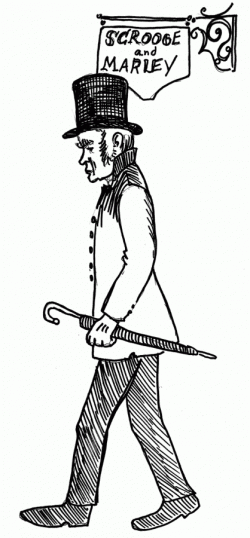Memorable: Great characters make great stories
Q. What's perhaps the truest yardstick for a fictional work's success, going well beyond a hefty advance, rave reviews or sales in the millions? –J. Casey
A. Characters from the story are so colorful and unforgettable that they take on a life of their own and become immortalized in the pages of English-language dictionaries, says Anu Garg in The Dord, the Diglot, and an Avocado or Two. Think of that bah-humbugging, mean-spirited miser Scrooge in Charles Dickens' A Christmas Carol. Ultimately, Scrooge is reformed, but his penny-pinching earlier self lives on in our culture.
Then there are the Sherlocks in our midst, based on Sir Arthur Conan Doyle's mystery-solving detective Sherlock Holmes. And the Walter Mittys, ordinary folks who daydream incessantly of adventures and triumphs that in fact are way beyond them, from James Thurber's The Secret Life of Walter Mitty. From Jonathan Swift's novel Gulliver's Travels come Yahoos, derogatory for human beings at their worst, while George Bernard Shaw's play Man and Superman gives us Superman, for an ideal, superior man.
And we can add George Orwell's gripping political novel 1984 for the sinister, all-seeing presence of Big Brother and for the adjective Orwellian, conjuring up a terrifying futuristic totalitarian society.
Q. "A rough-coated, dough-faced ploughman strode through the streets of Scarborough, coughing and hiccoughing thoughtfully." Enough already, but enough of what? –L. Logue
A. This sentence contains the "ough" syllable pronounced in eight different ways, reports the Central Washington University Writing Center. That's "rough" (rhymes with "stuff"), "dough" (rhymes with "no"), "plough" (alternate spelling of "plow"), "through" (rhymes with "do"), "Scarborough" (as in "curragh" and others), "cough" (rhymes with "off"), "hiccough" (alternate of "hiccup") and "thoughtfully" (sounds like "awe").
Is it any wonder that non-native speakers of English have some difficulties with proper pronunciation.
Q. Where did Leonardo da Vinci do his preliminary work before completing his masterpiece "Mona Lisa"? –L. Parsons
A. X-rays today of the painting reveal three completely different versions of the same subject, all painted by da Vinci under the final portrait, says David Hoffman in Little-Known Facts About Well-Known Stuff.
Q. Please don't take this personally, but we think it's likely your friends have more friends than you do. Why? –M. Zuckerberg
A. Dubbed the "friendship paradox," this social networking phenomenon was described by sociologist Scott Feld in 1991, says Mark Wilson in Physics Today magazine.
Consider a group of randomly chosen people, each asked to name a friend. Since more extroverts are likely to be named than loners, the nominated friends will have, on average, more social ties than the randomly chosen nominators. So the statement "your friends have more friends than you do" is typically true.
Interestingly, this phenomenon can provide early warning of the severity of an epidemic, according to Harvard sociologist Nicholas Christakis and UC-San Diego political scientist James Fowler. At the beginning of the flu season they selected two groups of Harvard undergraduates, one randomly chosen and their nominated friends. It turned out that the friend group– heavier social networkers– tended to get sick well before the random group, a trend discernable more than a month before the outbreak's peak.
"Armed with an advance warning from the health data about friends,” Christakis and Fowler wrote, “health officials could then decide how best to forestall an epidemic."
~
Send Strange questions to brothers Bill and Rich at [email protected]
